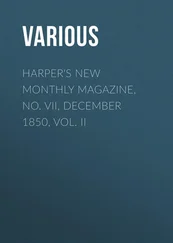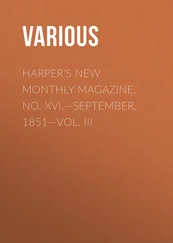Various - Harper's New Monthly Magazine, No. XXIV, May 1852, Vol. IV
Здесь есть возможность читать онлайн «Various - Harper's New Monthly Magazine, No. XXIV, May 1852, Vol. IV» — ознакомительный отрывок электронной книги совершенно бесплатно, а после прочтения отрывка купить полную версию. В некоторых случаях можно слушать аудио, скачать через торрент в формате fb2 и присутствует краткое содержание. Издательство: Иностранный паблик, Жанр: periodic, foreign_edu, на английском языке. Описание произведения, (предисловие) а так же отзывы посетителей доступны на портале библиотеки ЛибКат.
- Название:Harper's New Monthly Magazine, No. XXIV, May 1852, Vol. IV
- Автор:
- Издательство:Иностранный паблик
- Жанр:
- Год:неизвестен
- ISBN:нет данных
- Рейтинг книги:4 / 5. Голосов: 1
-
Избранное:Добавить в избранное
- Отзывы:
-
Ваша оценка:
- 80
- 1
- 2
- 3
- 4
- 5
Harper's New Monthly Magazine, No. XXIV, May 1852, Vol. IV: краткое содержание, описание и аннотация
Предлагаем к чтению аннотацию, описание, краткое содержание или предисловие (зависит от того, что написал сам автор книги «Harper's New Monthly Magazine, No. XXIV, May 1852, Vol. IV»). Если вы не нашли необходимую информацию о книге — напишите в комментариях, мы постараемся отыскать её.
Harper's New Monthly Magazine, No. XXIV, May 1852, Vol. IV — читать онлайн ознакомительный отрывок
Ниже представлен текст книги, разбитый по страницам. Система сохранения места последней прочитанной страницы, позволяет с удобством читать онлайн бесплатно книгу «Harper's New Monthly Magazine, No. XXIV, May 1852, Vol. IV», без необходимости каждый раз заново искать на чём Вы остановились. Поставьте закладку, и сможете в любой момент перейти на страницу, на которой закончили чтение.
Интервал:
Закладка:
On the same day in which Napoleon's pacific letter was sent to the King of England, another, of the same character, was dispatched to the Emperor of Austria. It was conceived in the following terms:
"Having returned to Europe, after an absence of eighteen months, I find a war kindled between the French Republic and your Majesty. The French nation has called me to the occupation of the First Magistracy. A stranger to every feeling of vain-glory, the first of my wishes is to stop the effusion of blood which is about to flow. Every thing leads me to foresee that, in the next campaign, numerous armies, ably conducted, will treble the number of the victims, who have already fallen since the resumption of hostilities. The well-known character of your Majesty, leaves me no doubt as to the secret wishes of your heart. If those wishes only are listened to, I perceive the possibility of reconciling the interests of the two nations.
"In the relations which I have formerly entertained with your Majesty, you have shown me some personal regard. I beg you, therefore, to see in this overture, which I have made to you, the desire to respond to that regard, and to convince your Majesty, more and more, of the very distinguished consideration which I feel toward you."
Austria replied, in courteous terms, that she could take no steps in favor of peace without consulting her ally England. Thus all Napoleon's efforts to arrest the desolations of war failed. The result had been anticipated. He was well aware of the unrelenting hostility with which the banded kings of Europe contemplated the overthrow of a feudal throne, and of the mortal antipathy with which they regarded the thought of receiving a democratic king into their aristocratic brotherhood. Nothing now remained for Napoleon but to prepare to meet his foes. The allies, conscious of the genius of that great captain who had filled the world with the renown of his victories, exerted themselves to the utmost to raise such forces, and to assail Napoleon with numbers so overwhelming, and in quarters so varied as to insure his bewilderment and ruin. The Archduke Charles, of Austria, who was practically acquainted with the energy of Napoleon, urged peace. But England and Austria were both confident that France, exhausted in men and money, could not hold out for another campaign.
The Bourbons now made an attempt to bribe Napoleon to replace them upon their lost throne. The Count of Provence, subsequently Louis XVIII., wrote to him from London, "For a long time, general, you must have known the esteem in which I hold you. If you doubt my gratitude, mark your own place. Point out the situation you wish for your friends. The victor of Lodi, Castiglione, and Arcola, can never prefer a vain celebrity to true glory. But you are losing the most precious moments. We could secure the happiness of France. I say we, for I require Bonaparte for such an attempt, and he could not achieve it without me. Europe observes you. Glory awaits you. I am impatient to restore peace to my people."
Napoleon did not imitate the example of the King of England and pass this letter over to his minister. Courteously and kindly, with his own hand he replied. "I have received your letter. I thank you for the obliging expressions it contains respecting myself. You should renounce all hopes of returning to France. You could not return but over the corpses of 100,000 Frenchmen. Sacrifice your interest to the happiness and repose of your country. History will duly appreciate your conduct, in so doing. I am not insensible to the misfortunes of your family, and shall learn with pleasure that you are surrounded with every thing which can restore the tranquillity of your retreat."
Benedict Arnold attempted to bring the American Revolution to a close by surrendering the United States to their rejected king. It was not in Napoleon's line of ambition to imitate his example. The Bourbons, finding the direct proffer of reward unavailing, then tried the effect of female blandishments. The fascinating Duchess of Guiche, a lady of great beauty and talent, was dispatched a secret emissary to the court of the First Consul, to employ all the arts of eloquence, address, and the most voluptuous loveliness, in gaining an influence over Napoleon. Josephine, who had suffered so much during the Revolution, and whose associations had been with the aristocracy of France, was a royalist. She trembled for the safety of her husband, and was very anxious that he should do whatever in honor might be done, to restore the Bourbons. In every possible way she befriended the royalists, and had secured, all over Europe, their cordial esteem. The Duchess of Guiche easily got access to Josephine. Artfully she said, one morning at the breakfast-table, "A few days ago I was with the Count of Provence in London. Some one asked him what he intended to do for Napoleon, in the event of his restoring the Bourbons. He replied, 'I would immediately make him Constable of France, and every thing else which he might choose. And we would raise on the Carrousel, a magnificent column, surmounted with a statue of Bonaparte crowning the Bourbons.'" Soon after breakfast Napoleon entered. Josephine most eagerly repeated the words to him. "And did you not reply," said Napoleon, "that the corpse of the First Consul would be made the pedestal of the column." The fascinating duchess was still present. She immediately assailed Napoleon with all her artillery of beauty, smiles, and flattery. The voluptuous freedom of her manners, and the charms of the bewitching emissary, alarmed the jealousy of Josephine. Napoleon, however, was impervious to the assault. That night the duchess received orders to quit Paris; and in the morning, in the charge of the police, she was on her way toward the frontier.
It has often been said that Napoleon made overtures to the Bourbons for the cession of their rights to the throne. In reference to this assertion Napoleon says, "How was such a thing possible? I, who could only reign by the very principle which excluded them, that of the sovereignty of the people; how could I have sought to possess, through them, rights which were proscribed in their persons? That would have been to proscribe myself. The absurdity would have been too palpable, too ridiculous. It would have ruined me forever in public opinion. The fact is that neither directly nor indirectly, at home or abroad, did I ever do any thing of the kind."
The report probably originated in the following facts. Friendly relations were at one time existing between Prussia and France. The Prussian government inquired if Napoleon would take umbrage if the Bourbon princes were allowed to remain in the Prussian territory. Napoleon replied that he had no objections to that arrangement. Emboldened by the prompt consent, it was then asked if the French government would be willing to furnish them with an annual allowance for their support. Napoleon replied that it should be done most cheerfully, provided Prussia would be responsible for the princes remaining quiet, and abstaining from all intrigues to disturb the peace of France.
A few evenings after this last attempt of Louis XVIII. to regain the throne, Napoleon was one evening walking with Bourrienne in the gardens of his favorite retreat at Malmaison. He was in fine spirits, for all things were moving on very prosperously.
"Has my wife," said he to Bourrienne, "been speaking to you of the Bourbons?"
"No, general!" Bourrienne replied.
"But, when you converse with her," Napoleon added, "you lean a little to her opinions. Tell me now, why do you desire the return of the Bourbons? You have no interest in their return; nothing to expect from them. You can never be any thing with them. You have no chance but to remain all your life in an inferior situation. Have you ever seen a man rise under kings by merit alone?"
"General," replied Bourrienne, "I am quite of your opinion on one point. I have never received any favor under the Bourbons; neither have I the vanity to suppose I should ever rise, under them, to any conspicuous station. But I look at the interests of France. I believe that you will hold your power as long as you live. But you have no children, and it is pretty certain that you will never have any by Josephine. What are we to do when you are gone? What is to become of France? You have often said that your brothers were not – "
Читать дальшеИнтервал:
Закладка:
Похожие книги на «Harper's New Monthly Magazine, No. XXIV, May 1852, Vol. IV»
Представляем Вашему вниманию похожие книги на «Harper's New Monthly Magazine, No. XXIV, May 1852, Vol. IV» списком для выбора. Мы отобрали схожую по названию и смыслу литературу в надежде предоставить читателям больше вариантов отыскать новые, интересные, ещё непрочитанные произведения.
Обсуждение, отзывы о книге «Harper's New Monthly Magazine, No. XXIV, May 1852, Vol. IV» и просто собственные мнения читателей. Оставьте ваши комментарии, напишите, что Вы думаете о произведении, его смысле или главных героях. Укажите что конкретно понравилось, а что нет, и почему Вы так считаете.












